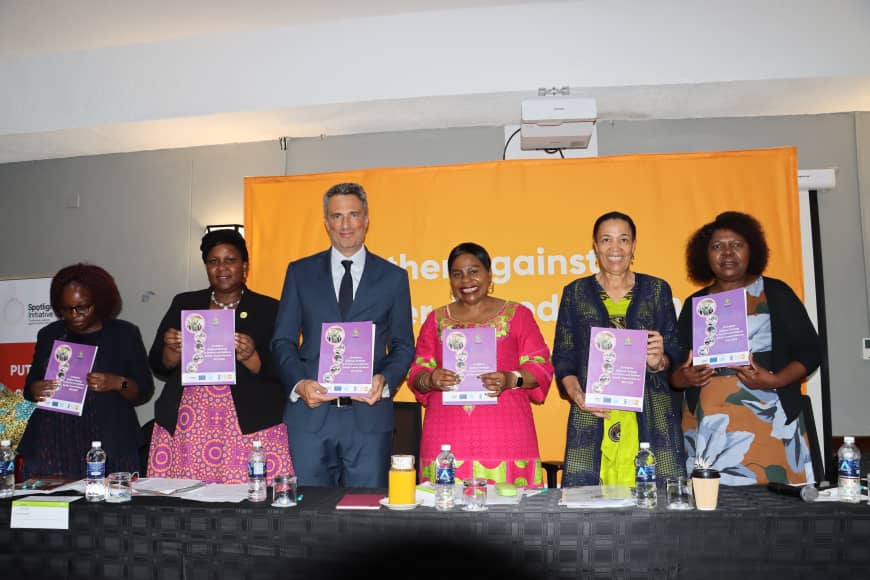|
Getting your Trinity Audio player ready...
|
The National Strategy to Prevent and Respond to Gender-Based Violence (2023-2030), which precedes the “Zero Tolerance 365: National Program on GBV Prevention and Response” has been launched as a guiding framework to address the vice.
In her keynote address during the launch on Friday 15 December 2023 at the Holiday Inn Hotel in Harare, the Minister of Women Affairs, Community, Small, and Medium Enterprises Development, Hon. Monica Mutsvangwa lauded the collaborations, partnerships, and tremendous work by stakeholders in various spaces towards GBV prevention and response.
Several dignitaries across various sectors witnessed the launch. In attendance were the EU Ambassador to Zimbabwe, HE Jobst Von Kirchmann, and Ambassadors drawn from all the continents. To grace the occasion was also the United Nations Resident Coordinator, HE Edward Kallon, who was represented by Ms. Loveness Makonese, the UN Women Deputy Country Representative and representative from UN Agencies.
The World Bank Country Manager, Eneida Fernandes; SADC Secretariat delegation, led by Kealeboga Moruti, Senior Officer – Public Security; the CEO of the Zimbabwe Gender Commission, Mrs. Virginia Muwanigwa; representatives from other independent Commissions; other Senior Government Officials; and representatives of civil society organisations (CSOs) were also in attendance.
“I am impressed by the collaborations, partnerships, and tremendous work you have all been doing in various spaces towards GBV prevention and response, and I am confident that the momentum is upscaled going forward. We recently commemorated the 16 Days of Activism against GBV, and there was so much activity across the Country. Indeed, the 16 Days period is meant to amplify our voices but our work goes beyond the 16 days. We have also been implementing the outgoing Strategy alongside the Spotlight Initiative which was a joint programme supported by the European Union and the United Nations. The Spotlight Initiative’s contribution to change within the 4 years of its implementation has been remarkable.
“As we build on this great work our goal is to sustain the gains of Spotlight amongst many other great initiatives that we have all been implementing. Ladies and gentlemen, the GBV Strategy development process was a consultative process that took at least a year to complete. We carried out physical review and validation meetings with support from the SADC Secretariat, UNDP, and UNFPA under the Spotlight Initiative, and we also carried out a GBV assessment supported by the World Bank whose findings were very useful in informing the Strategy direction. The Spotlight reports and experiences also provided substantial evidence for future program design and this we incorporated in our National Strategy to Prevent and Address Gender Based Violence. Having the Strategy in place now is a milestone development, and we all should be proud of the work we put in,” Hon Mutsvangwa said.
The Government of Zimbabwe has placed the issues of addressing gender-based violence high on its agenda. President, Dr. E.D. Mnangagwa launched the High-Level Political Compact on Ending Gender-Based Violence and Harmful Practices in October 2021, which is a recommitment towards ending Gender Based Violence in the country. The GBV Strategy is a tool that will also serve to actualise this commitment made as a country.
The Constitution provides a solid point of reference in terms of advancing gender equality and elimination of Gender Based Violence, and one of its founding principles is gender equality. In the same vein, National Development Strategy 1 recognizes gender mainstreaming in all sectors of the economy as an essential tool “to eliminate all negative economic, social and harmful practices that impede equality of the sexes”. This is key to achieving our Vision 2030, that of an upper middle-income economy.
The government has put in place legal and policy frameworks backed by institutional mechanisms that are working towards Gender Based Violence prevention and response. Laws such as the Domestic Violence Act continue to work for the protection of all victims of domestic violence. The Government has also activated the institutional machinery through the establishment of a robust multi-sectoral gender mechanism, spearheaded by the Ministry of Women Affairs, Community Small and Medium Enterprises Development. Key institutions such as the Zimbabwe Gender Commission, Anti Domestic Violence Council, and other institutions and structures promoting gender equality are critical. It is important to ensure that these institutions are adequately resourced and operationalized to serve their purpose.
In addition to these institutions, Zimbabwe is rich in culture and traditions that are important for daily lives, with traditional leaders as custodians.
Similarly, the democratic system has given space to citizens to affiliate with religious groupings of their choice. To that end, the culture and religious practices must continue to frown on some of the unacceptable practices like child marriage which undermine the rights of girls and boys.
The Constitution remains the supreme law of the land and any harmful cultural and religious practices that infringe on the rights of any citizen should be stopped. All religious and cultural practices must remain within the confines of what is legally acceptable.
“Government acknowledges and expresses gratitude to the contribution of Civil Society Organisations in our Gender Based Violence prevention and response efforts. It is also my strong belief that as we continue to address this scourge effectively, it is critical to address the root causes in particular issues of economic empowerment of women as lack of it increases women and girls’ vulnerability.
“Allow me to congratulate all stakeholders who have been involved in the development of this Strategy, which will greatly enhance our multi-sectoral coordination in preventing and responding to GBV and promoting Gender Equality in the country. From the presentation made by our Consultant, Mr. George Zimbizi, I am sure we all now have an appreciation of the scope of the Strategy, which I must say is quite comprehensive. Thank you and well done for consolidating all the diverse input into this Strategic document,” Hon Mutsvangwa added.






